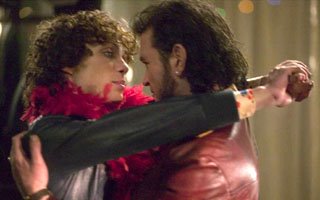
I choose this scene to look at in detail for my textual analysis as it is the first time the audience see the protagonist Patrick “Kitten” Braden fully cross-dressed. Also, it’s one of the few scenes that shows a general reaction to Kitten dressed as a woman.
MEDIA LANGUAGE: The opening shot of this scene begins as the camera pans over a crowd of young people dancing. Generally their clothes are quite conservative and typical of the 1970s era. Protagonist Kitten, lead singer Billy and the band are onstage. Both Kitten and Billy are wearing gold that connotes glamour and riches. Kitten is also wearing glitter, this links with the glam rock era. Editing includes fades which creates a romantic, dreamy atmosphere. A close-up of the face of Billy and Kitten shows their facial expressions. Kitten looks infatuated with Billy while he returns an intense stare. The camera circles them to show both expressions but focuses on Kitten, the protagonist. Dark lighting in the scene also creates romance. Kitten is dressed as a squaw; this connotes an “enslaved and voiceless child bearer” (wikipedia). This costume therefore shows Kitten as the inferior person in the relationship, to a more dominant Billy. There is a close-up on the bands expression showing their low opinion of the match between Kitten and Billy. The British soldier’s uniform and gun show his power and authority. Back at the tent Irish colours around the pole show the contrast between the British and the Irish. The camera zooms out to show the crowd generally dancing and enjoying themselves. As it reaches the back it shows a group of males in front of a green sign saying “Republican Prisoners Welfare Association”, the green connotes Ireland. Billy and Kitten are shown as silhouettes behind the tent, this connotes their concealed and secret romance. The camera pans across the band to show their disapproving looks.
INSTITUTION: The British Army is shown as powerful. They control the border between the North and the South of Ireland. The British soldier is also portrayed as the Proppian villain and the band are powerless to act against him.
GENRE: This scenes shows the film as a drama as it tackles the issue of the treatment of the Irish by the British army and also the treatment of Kitten, a cross-dresser, by the crowd. There are also elements of comedy shown here, for example irony is created when the audience sees a close-up of a band member who disapproves of Kitten while wearing heavy make-up himself.
REPRESENTION: The young people in the scene are represented dancing and having fun. However the scene is tame considering the usual depictions of the hedonistic glam rock era. In the relationship between Billy and Kitten, Billy is shown as the male. He asserts his dominance with his intense stare. The lyrics of the song also reinforce this message; Kitten’s lines seem to want to please Billy. Kitten is shown as infatuated like a young girl and is physically attractive compared to Billy, who is older. The British solider is represented as in charge and powerful. The band in the van are under his control in their crossing the border. The soldier controls Billy who is an otherwise strong, forceful character. The older generation at the back of the crowd are more conservative and not open to the transgressive nature of Kitten’s performance. Mainly males retaliate against the performance suggesting that they are more traditional than their female counterparts.
AUDIENCE: This scene indicates that the audience for the film would be older, of about 24-36 in age as they would better understand the situation- The Troubles and also be more attracted to a story about the 1970s era.
VALUES & IDEOLOGY: In this scene the audience sees a tame version of expectations of the glam rock era. In the relationship between the protagonist and Billy, Billy is dominant and Kitten is the ‘squaw’. However, Kitten volunteered to be squaw, which suggests a desire to be submissive to a dominant partner. The band is embarrassed by Kitten and Billy, which suggests that they too are more conservative. Kitten comes across as typically feminine, dependent on Billy and doting on him. Kitten is also outwardly feminine due to the clothing and voice. The cross-dressing in this scene is generally accepted by the younger members of the crowd who dance along to the music. The British Army here is created in the Proppian villains. They are in charge of the borders and the British solider seems to enjoy the deaths of the Irishmen. Billy is helpless to retaliate in this instance. A small group of older males object to Kitten’s performance and resort to throwing cans to the stage. This expresses their conservative ideology. The silhouette used in Billy and Kitten’s conversation suggests that their romance is forbidden and mysterious. Kitten also objects to being called Patrick, wanting to be more feminine and treated as woman. Throughout the film there are no sexually explicit scenes which suggests that the sexuality in the film is more important than the actual sex.
NARRATIVE: Kitten meets Billy and his band “The Mohawks” when hitchhiking. Kitten suggests that the band need a squaw, lead singer Billy agrees and he joins their stage act. However, members of the band and some of the crowd do not appreciate Kitten’s performance and Billy suggests Kitten leaves the band.

0 Comments:
Post a Comment
<< Home